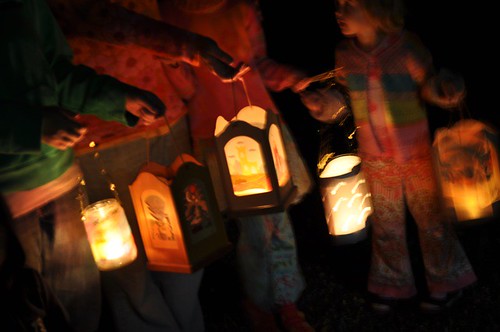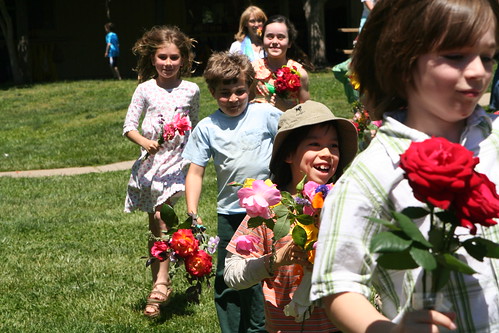And so my childhood memories flow in a cycle from one year to the next, dotted with Valentine boxes and songs from winter concerts. It's not unusual for memory to be tied to seasonality and celebration. Festival life has been an anchor for humankind for thousands of years, providing a way to mark the passage of time and to form community bonds. In her article Community Celebrations as Ritual Signifiers, published in 2002 in Visual Arts Research, Deborah L. Smith-Shank outlines the important role that celebrations play in the lives of children. At their most basic level, celebrations provide a structure for our lives. Their ritual behaviors (such as blowing out birthday candles) and annual repetition give children a sense of expectation and safety. Additionally, the cyclical nature of celebrations allow us to simultaneously reflect on previous years' memories and anticipate future ones. Our shared experiences and anticipations bring us closer together as members of a community. Smith-Shank writes,
"Community celebrations are an important socializing force, not only for newcomers to a community but also for children. Through their participation in community celebrations, children learn to participate in the construction and the consumption of their cultures. They learn social expectations. They learn to delay gratification."Delayed gratification is quite often met with negative reaction in today's world of instant information and communication. It is, however, something to consider seriously. Delayed gratification gives us the opportunity to anticipate. It teaches children that the future holds things worth looking forward to--the special days that mark our shared existence.
Aside from their importance in providing children with a sense of time, place, and belonging, Smith-Shank writes that celebrations function as unique points of inquiry:
"[Community celebrations] can help us by answering significant questions about our histories, our communities, and ourselves. These rich storehouses of local legend and culture can provide us with information about history, art, family life, ecology, heritage, and ethics."When observed through this lens, celebrations are seen as an important form of literacy for children. They provide children with the opportunity to examine some of life's biggest questions: Who am I, where did I come from, and how am I connected? What does this ritual say about me? What does it say about us?
Because celebrations are such crucial avenues of meaning-making for children, it troubles me how few opportunities for celebration I observe in schools today. I see almost no examples of celebrations that include the larger community, comprised of the entire student body, parents, siblings, and others. Slightly more often I observe celebrations that take place within an isolated classroom, such as a Valentine's Day party, but the type of celebration that I see taking place most often in elementary schools is one that is based on academic achievement, such as "Accelerated Reader (AR) Parties." These celebrations are part of a reward system for students who achieve a certain level of proficiency in an academic program. By their very nature, academic reward celebrations are conditional and exclusionary: children who do not meet the required level of proficiency are not permitted to attend. What are the implications of a childhood in which our participation in the celebrations that root us in time, place, and identity are not guaranteed? By excluding children from celebrations, what message are we sending them about their place in a community?
Many educators have eliminated celebrations with cultural or religious origins from the classroom in an attempt to prevent children from other cultures from feeling unrepresented. Educators may also fear the reaction of parents who might disagree with having a child exposed to ideas and traditions from other cultures or religions. Although this elimination may be well-meaning, it has a negative effect on the classroom community: a group of students who possess a rich variety of experiences have fewer opportunities to share them. A formerly multicultural group is left cultureless. Instead of eliminating multicultural celebrations, teachers should make an attempt to include traditions from each student's culture, creating an atmosphere of safety and respect, where empathy and understanding is cultivated.
Celebrations are incredibly important to the life of a child: as structure, history, community-builder, and point of inquiry, celebration should play an active and vital role in curriculum. Educators should allow students the opportunity to experience celebrations that involve the classroom community, the school community, and the greater community around them.




Eliminate the celebration of specific holidays but invite children to share with their families, if possible, what holidays they celebrate and how they celebrate them. Celebrating only certain holidays in your classroom does alienate some children and families. Christmas and Easter as well as St. Patrick's Day decorations should not be all over the classroom because there are children who do not celebrate these holidays , which are religious.
ReplyDeleteIn the cooperative preschool in which I was first a parent and then the Director, we allowed the children to share their holidays and rituals with each other. This creates community.